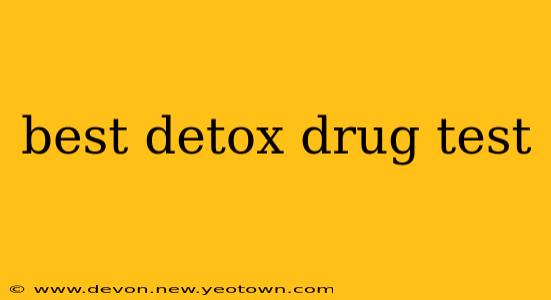The Quest for the "Best" Detox Drug Test: Separating Fact from Fiction
The search for the "best" detox drug test is a journey fraught with misinformation and unrealistic expectations. Let's be clear: there's no magic bullet that will instantly cleanse your system and guarantee a negative result. However, understanding the different types of tests and the factors influencing their accuracy can empower you to make informed decisions. This isn't about cheating a test; it's about understanding the science behind detection and making responsible choices.
My name is Alex, and for years, I've worked in a lab conducting and analyzing drug tests. What I've learned isn't just about the technical aspects, but the emotional weight these tests carry for individuals. This article will guide you through the complexities, separating the hype from the reality.
What are the different types of drug tests?
The most common types of drug tests, each with its own detection window (the time frame a drug is detectable), include:
-
Urine Tests: These are the most common and relatively inexpensive. They detect a wide range of drugs, but the detection window varies depending on the drug and individual factors like metabolism and frequency of use.
-
Blood Tests: Blood tests offer the shortest detection window, but they're more expensive and invasive. They’re primarily used in emergency situations or specific medical investigations.
-
Hair Follicle Tests: These tests boast a much longer detection window, typically up to 90 days, but are more expensive. They're less sensitive to recent drug use, making them better suited for long-term monitoring.
-
Saliva Tests: These tests offer a shorter detection window than urine tests, usually a few days, making them useful for more immediate detection. They are non-invasive and convenient.
How long do drugs stay in your system?
This is a question I hear constantly. The truth is, it's not a simple answer. Several factors influence how long a drug remains detectable:
-
Type of drug: Different drugs metabolize at different rates. Some, like marijuana, can remain detectable for significantly longer periods than others.
-
Frequency of use: Consistent use leads to a longer detection time.
-
Metabolism: Your body's metabolism plays a crucial role in how quickly it processes and eliminates substances.
-
Dosage: Higher doses generally result in longer detection times.
-
Hydration levels: Staying well-hydrated can slightly speed up elimination.
Can detox products effectively cleanse your system?
While many detox products claim to cleanse your system rapidly, the scientific evidence supporting these claims is limited. Many of these products rely on diuretics to increase urination, potentially leading to dehydration and other health complications. It's crucial to approach such products with caution and consult a healthcare professional before use.
What is the most accurate drug test?
There isn't a single "most accurate" test. Accuracy depends on the type of test, the drug in question, and the individual's metabolism. Laboratory-conducted tests, specifically those using gas chromatography-mass spectrometry (GC-MS), are generally considered the most accurate but are not typically available for at-home use.
Are home drug tests reliable?
Home drug tests offer convenience, but their accuracy can be variable. Always choose tests from reputable manufacturers that provide clear instructions and indicate the sensitivity and specificity of their testing. Remember, a negative result on a home test doesn't guarantee a negative result on a laboratory test.
The Bottom Line:
The search for the "best" detox drug test is often a misguided one. Focus instead on making informed choices about your health and understanding the limitations of testing methods. If you have concerns about drug testing, consult a healthcare professional. They can provide accurate information, guidance, and support based on your specific situation. Remember, honesty and responsibility are always the best approach.

